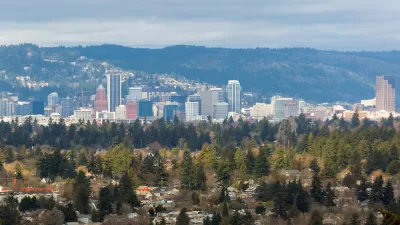The city of Portland is already building upon the historic work of the Residential Infill Project, approved by the city in August 2021, with a new slate of zoning changes dubbed the ‘Residential Infill Project – Part 2.”

“Portland City Council unanimously approved a bevy of alternative housing developments that they say will provide lower-cost options and increase housing density within city limits,” reports Jayati Ramakrishan in a paywalled article for The Oregonian.
The changes to the city’s historic “Residential Infill Project,” approved in August 2021, allow new forms of housing on residential parcels previously zoned for a single-family detached house. “The new rules permit new types of housing, and set new, more flexible rules for how the homes can be configured and how large they can be,” according to Ramakrishan.
More details about the Residential Infill Project – Part 2 (RIP2) is available on the city of Portland’s website. “RIP2 was unanimously approved by City Council and will expand housing opportunities in Portland’s very low density R10 and R20 zones, add allowances for attached houses and cottage clusters across all neighborhoods, and increase options for homeownership,” according to the website.
FULL STORY: Coming soon to Portland neighborhoods: more townhomes, six-plexes and other high-density housing

Planetizen Federal Action Tracker
A weekly monitor of how Trump’s orders and actions are impacting planners and planning in America.

Maui's Vacation Rental Debate Turns Ugly
Verbal attacks, misinformation campaigns and fistfights plague a high-stakes debate to convert thousands of vacation rentals into long-term housing.

San Francisco Suspends Traffic Calming Amidst Record Deaths
Citing “a challenging fiscal landscape,” the city will cease the program on the heels of 42 traffic deaths, including 24 pedestrians.

Defunct Pittsburgh Power Plant to Become Residential Tower
A decommissioned steam heat plant will be redeveloped into almost 100 affordable housing units.

Trump Prompts Restructuring of Transportation Research Board in “Unprecedented Overreach”
The TRB has eliminated more than half of its committees including those focused on climate, equity, and cities.

Amtrak Rolls Out New Orleans to Alabama “Mardi Gras” Train
The new service will operate morning and evening departures between Mobile and New Orleans.
Urban Design for Planners 1: Software Tools
This six-course series explores essential urban design concepts using open source software and equips planners with the tools they need to participate fully in the urban design process.
Planning for Universal Design
Learn the tools for implementing Universal Design in planning regulations.
Heyer Gruel & Associates PA
JM Goldson LLC
Custer County Colorado
City of Camden Redevelopment Agency
City of Astoria
Transportation Research & Education Center (TREC) at Portland State University
Jefferson Parish Government
Camden Redevelopment Agency
City of Claremont





























